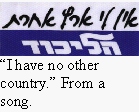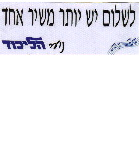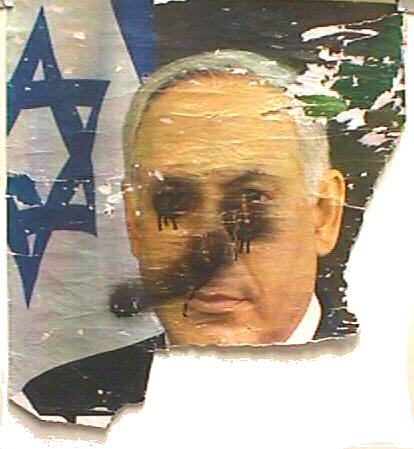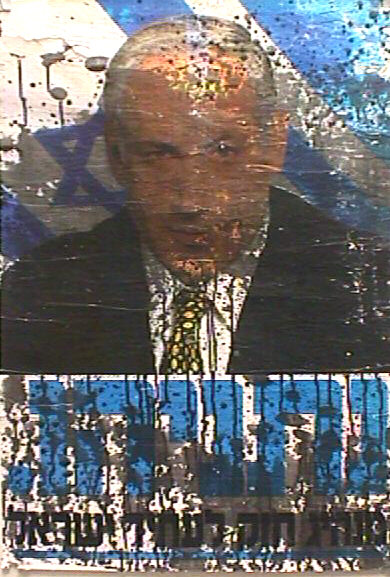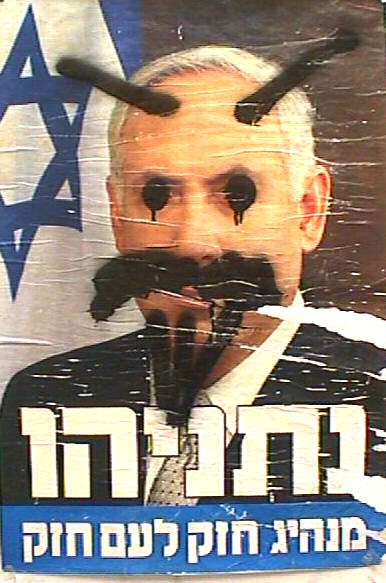Benjamin Netanyahu
| Netanyahu's face and style had been well-known
in America since the 1980s -- he had written several books on terrorism, was
Israel's UN ambassador, and appeared as a spokesman on news shows. His 1996
election victory over Shimon Peres was unexpected and a shock to those on the
left. The student who murdered Itzhak Rabin was in jail, but might get his way after all
-- by substituting Netanyahu and stopping the peace process. He was seen as willing to
fan the mutual resentments of various groups for his political goals, a tactic not valued
in a country that needs what unity it has.
Many working class Israelis identified with Netanyahu's
values. They knew him as "Bibi" and trusted him as a leader who shared their attitudes. When a
prominent actress, Tiki Dayan, characterized his
supporters as "assafsouf," the Hebrew equivalent of "rabble" or "riff-raff," bumper stickers
proclaimed "I am rabble." |
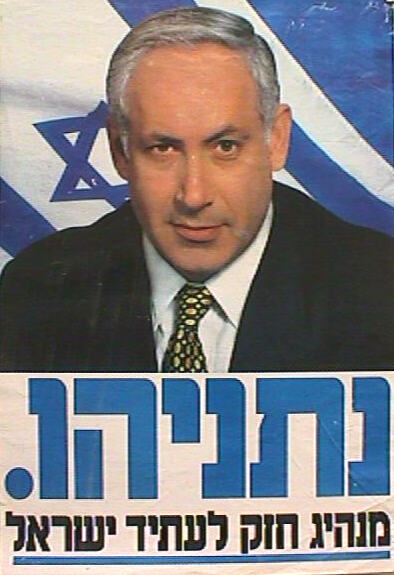 |

Framing
Most Israeli election posters gave not full-blown
arguments, but slogans. They used a non-rational but crucial phenomenon
in elections -- framing.
Framing an issue means putting it in a way that influences the
respondent's procedure in generating a position. If I recite statistics
opposing affirmative action and then ask for your opinion,
that's persuasion. But suppose I switch the question from
"affirmative action" to "reverse discrimination." That's
framing.
An experiment by Shafir and Tversky asked subjects about
a hypothetical child custody case. Parent A's personality was described as more extreme than
B on every dimension -- with better virtues and worse vices. Half were asked, which parent
should be awarded custody? 64% of them said parent A. The other half were asked which parent should
be denied custody, and 54% said parent A. The first group were led to focus on
reasons to give the child to a parent, and parent A had more of these reasons.
The second focussed on the negatives, and again parent A stood out and was denied custody.

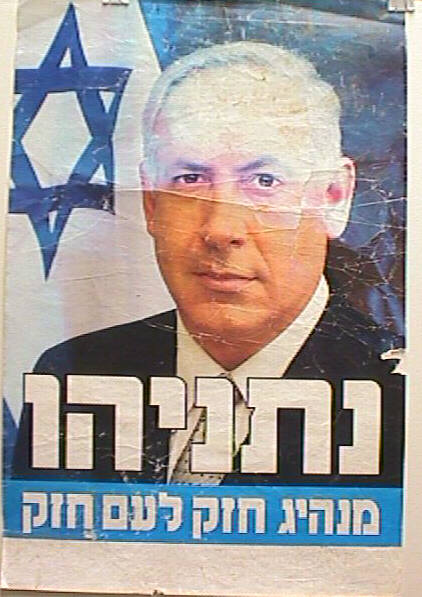
|
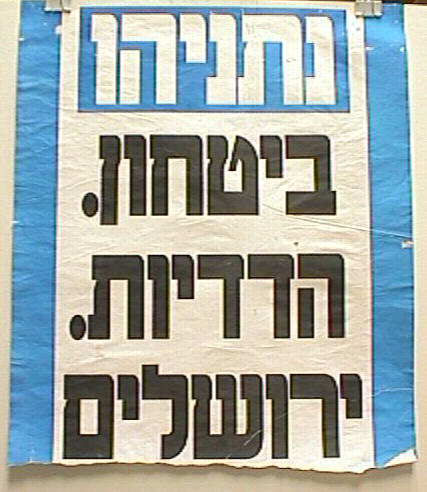 |
Framing an election campaign means defining what it is "about."
Netanyahu wanted the dimension of evaluation to be who was tougher on security issues.
In 1996 this had worked against Shimon Peres, who had been cast as weak and likely to divide
Israel. On the left above is a poster from early in the campaign, "a strong leader
for a strong nation." Still, he wanted to avoid the image of an extreme hawk. He
would keep up the peace process -- the righthand one promises security but
reciprocity over Jerusalem.

Here's a slew of bumper stickers with his ambivalent message: Israeli
unity, I'll promote peace, I'm the one to make Israel strong and secure. The sign at the
lower left is odd: "Peace has more than one song," words from a song known for having been
sung at the rally where Rabin was assassinated.

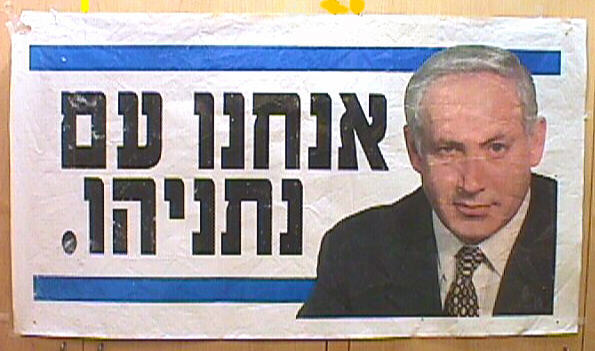 |
Netanyahu's "strong leader for a strong nation" slogan
was criticized as semi-fascist. What do you want, he said, a weak
leader and a weak nation? That was not the point. The slogan wasn't
an assertion of the best policy. It was framing, a claim
that the election was ABOUT choosing the toughest person. His later signs
moderated the slogan. It became a strong leader "for Israel" (the poster
at the top of this page), or a strong leader "for Israel's future," or the nonspecific
one shown at left, "We are with Netanyahu." |
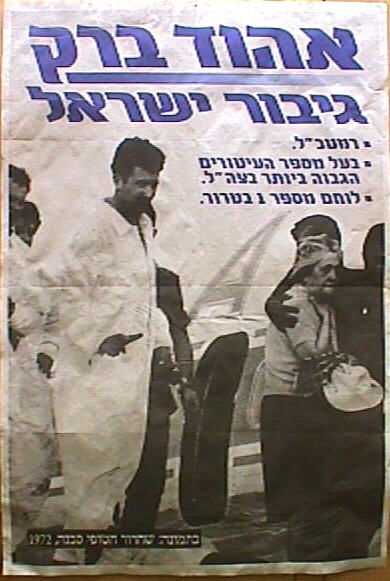 |
Who's-the-tougher was a less successful
frame against Ehud Barak, who had commanded
the raid in 1972 to free hostages from a hijacked airliner, a mission on
which, ironically, Netanyahu was his subordinate. Barak's
sign showed him as a young and trim soldier on the wing of the Sabena airliner
as the hostages were led out. The sign lists his toughness credentials, "Hero of Israel, Chief of Staff,
most decorated soldier in the IDF, foremost fighter against terrorism." |

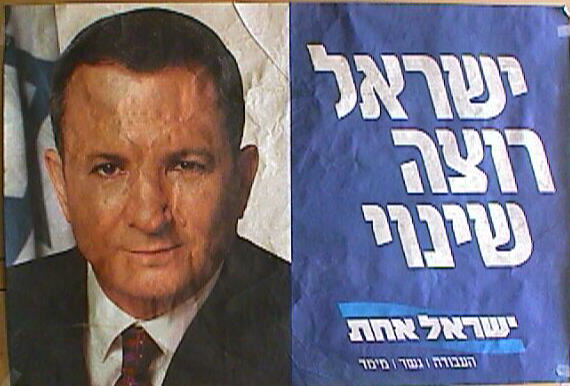
|
In Barak's frame, the election was about Netanyahu's
record and character. Bibi was personally distrusted. Whether this was justified
was a matter of debate. Stories circulated about his lying to associates, and
several party associates had resigned from his government. He was accused of
falsifying his name on a passport, misusing funds, even stealing towels from hotels
on foreign state visits. His supporters regarded this as a campaign initiated by
the media.
For Barak to define his campaign as simply anti-Netanyahu would have
been a mistake -- he needed to project a positive message.
He combined anti- and pro- postures with nebulous slogans like, "There's
hope with Barak" and "Israel wants change." Change in what? Hope for what?
The voter could read in either a promise of better policies, or a negative
message, dump Netanyahu.
|
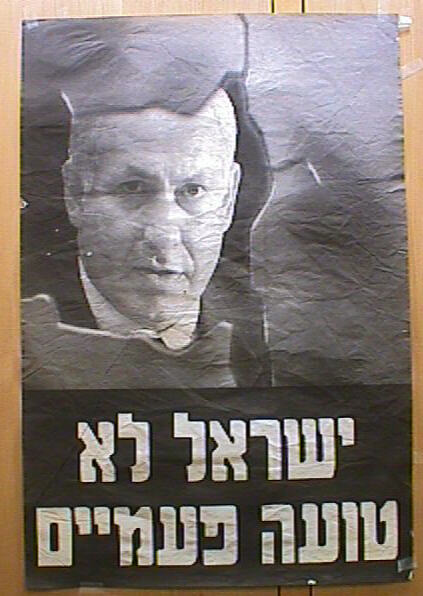 |
Signs showing Barak never mentioned Netanyahu,
but shadow organizations put up explicitly anti-Netanyahu posters. These groups were
set up to circumvent spending-limit laws.
Here a black-and-white Netanyahu peers through some kind of fractured wall:
"Israel doesn't make the same mistake twice." Everyone could read in their own
version of why electing him had been a mistake. |
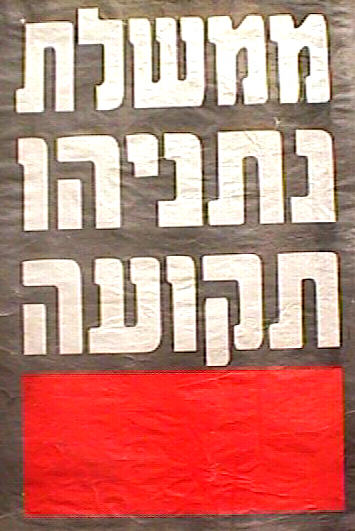 |
"The Netanyahu government is stuck." This suggests a link of
his foot-dragging on the peace process with the slow economy. |
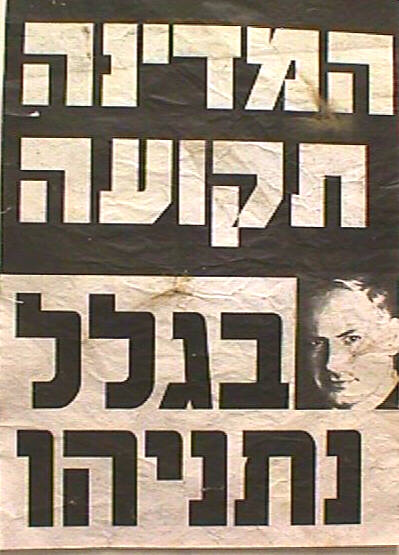 |
"The country is stuck because of Netanyahu" |
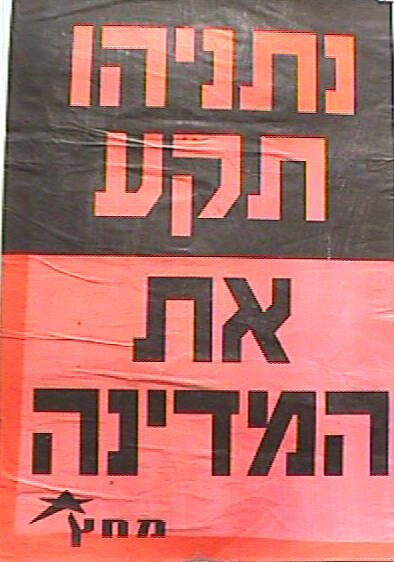 |
From some group named Makhatz:
Netanyahu has "stuck" the country, slang that means in Hebrew what it means in English.
|
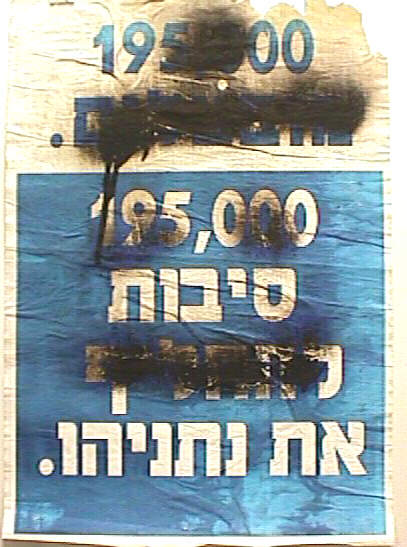 |
Continuing the economy frame: there are 195,000
reasons [the count of the unemployed] to vote against Netanyahu. |

Jerusalem graffiti: In line with framing the election as over
Netanyahu, artists would assault his physiognomy rather than his message.
Almost always the eyes were blotted out. The Pinnochio motif was common. Visitors to
the Barak website clicked on Netanyahu's face, to see his nose grow and read a
recent lie he had told.

 |
"Rak Netanyahu" -- Only Netanyahu, a popular bumper sticker,
akin to "Nixon's the one." |
 |
"Only a freiher would vote for Netanyahu
the second time." Freiher is borrowed from German with a special negative meaning in Israel
-- a sucker, someone who is sheeplike, follows the rules because they're told to, does someone else's work. |
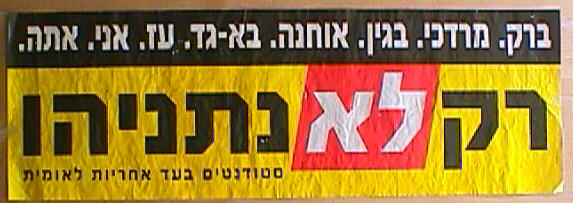 |
A student group claims to be the source of this common
poster, which plays on Only Netanyahu. [Vote for] Barak, Mordechai,
Begin, Ochana (a soccer star), Bagad (an eccentric politician), a goat, me, you - only NOT
Netanyahu. |

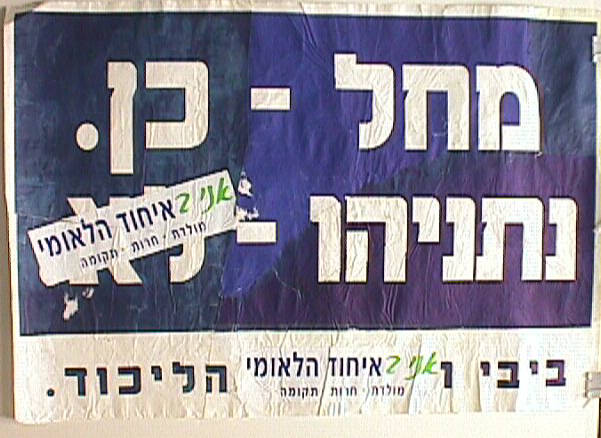
|
Some of his party members began to see Netanyahu as a
liability. This sign appeared just before the election. The party yes, but
Netanyahu no -- Bibi is destroying it. But most stayed loyal, and these signs were immediately
slashed, plastered over or ripped off. The one shown here was assembled from
five different copies I collected from different heaps. The stickers used to cover it up are clues
to the politics of the person that applied them. They are from
Benny Begin's rightwing National Unity Party, which was supporting Netanyahu for PM.
|
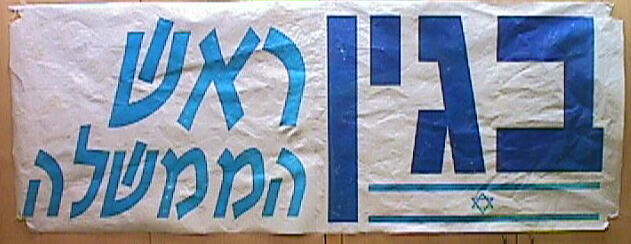 |
Netanyahu faced the problem that various coalitions
that had supported him had shifted -- Sharansky's Russian Ba'Aliya party was drawing
supporters over to Barak. The race for prime minister had started with three other candidates in
addition to Netanyahu and Barak:
|
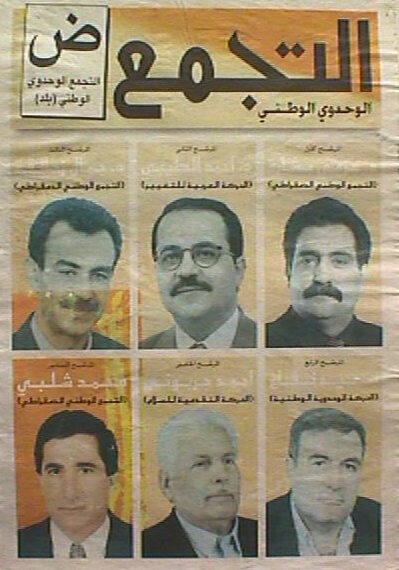 |
- Itzhaak Mordechai, of the appropriately named Center Party.
- Benny Begin of the hawkish National Unity Party (the sign on the left says
"Begin, Prime Minister")
- Azmi Bishari, the first Arabic candidate for prime minister,
The sign shows Bishari (top right) with the members of the party "list,"
its candidates for the Knesset. The day before the election, all three withdrew.
Mordechai and Bishari's supporters would be voting for Barak, so Netanyahu's
hope for a split vote and a two-candidate runoff
was gone. |
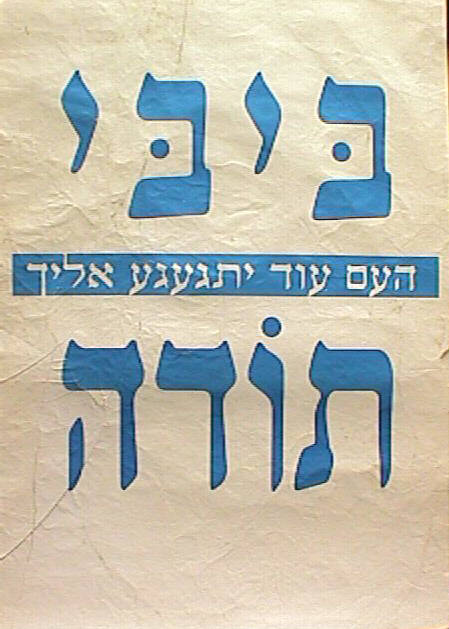
|
Netanyahu lost decisively, but his followers stayed loyal -- this poster went up right
after his loss: "Bibi, Thank You. Our
nation will miss you yet."
|
So far this hasn't happened. Netanyahu resigned the party
leadership, and it passed to Ariel Sharon. More scandals came out
that reinforced the image of petty dishonesty. However, his popularity
among some groups remains high. He has suggested he might form his
own party, and his return to the government seems possible, given Israel's
system of proportional representation and coalitions.



